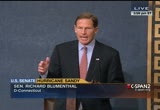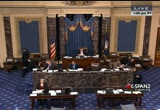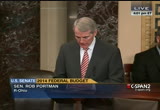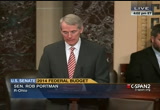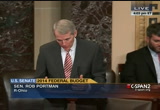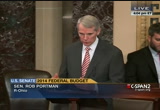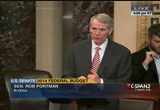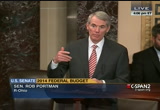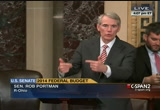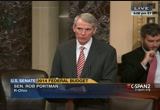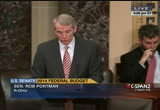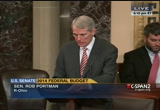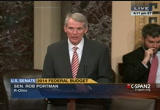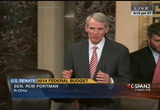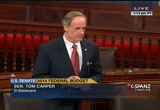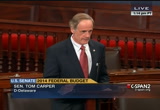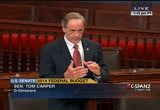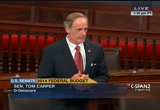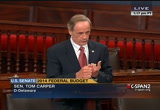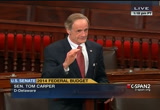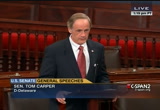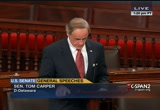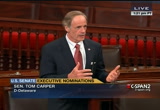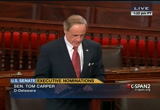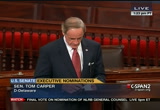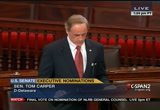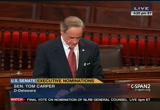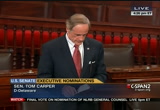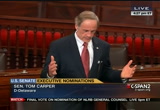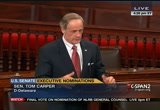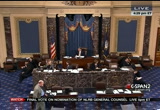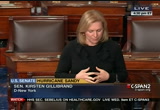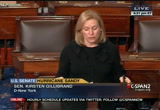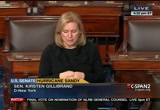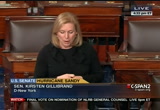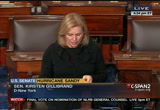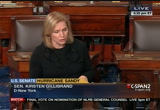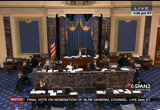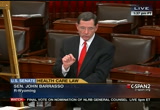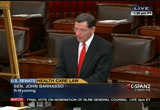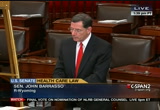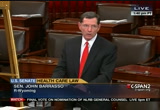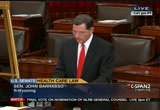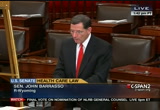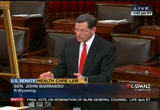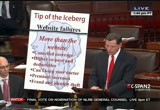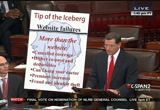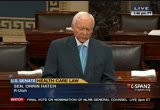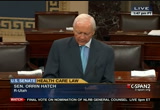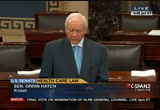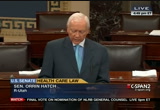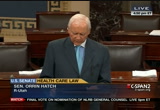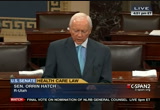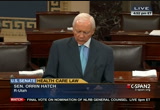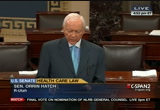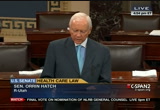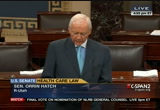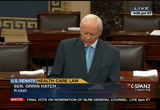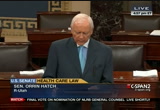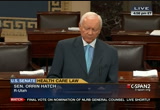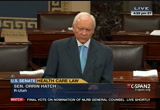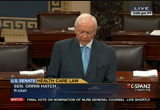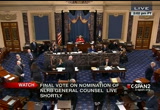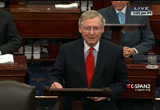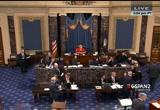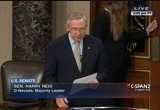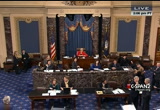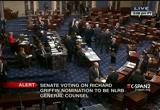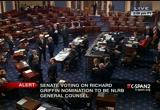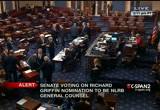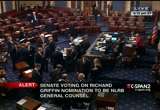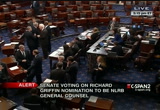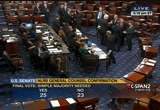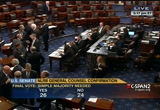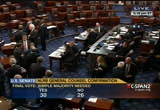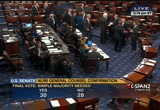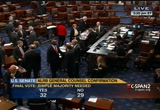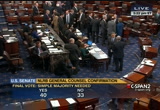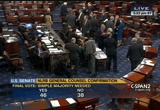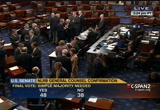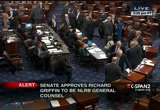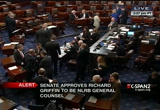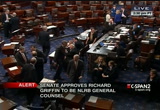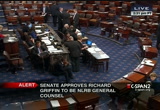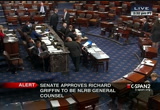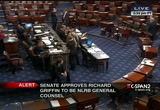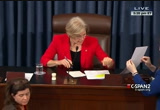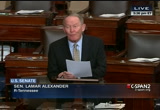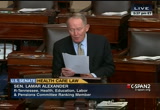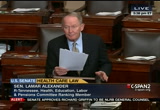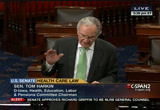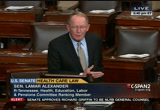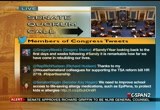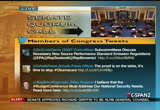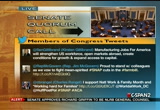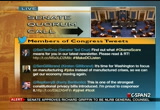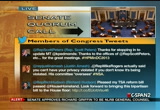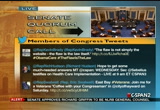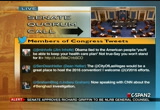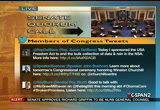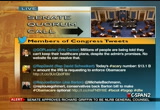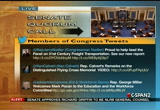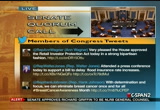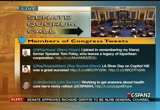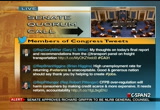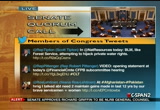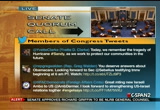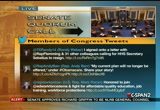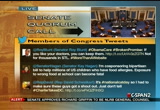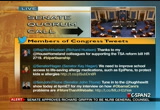tv Key Capitol Hill Hearings CSPAN October 29, 2013 4:00pm-6:01pm EDT
4:00 pm
sandy task force and seeking to remedy or correct perhaps some of the logjams and red tape and deficiencies in process that led the people of our states to wait for so long before they saw relief in practical terms. and so i want to thank them for their eloquence today, for their truly formidable contribution on the issue of climate change and global warming and to thank them also for the very powerful contribution they have made on the response to storm sandy that affected so many people in connecticut. thank you, mr. president. i yield the floor. a senator: mr. president?
4:01 pm
the presiding officer: the senator from ohio. mr. portman: mr. president, i rise to talk about an opportunity, something good that this body could do for the american people, for the economy and for the taxpayers. tomorrow, the senate budget conference that was established as part of this recent agreement that was made over reopening the government and extending the debt limit will meet. this will be the first public meeting of the group. we have had some other meetings, including one i just had with some of the members of that group, but this is the first opportunity for us to meet as house members, senate members, republicans and democrats in this budget conference. and it couldn't come soon enough. the opportunity we have with this group is that in the wake of what happened at the beginning of this month, which was again a government shutdown and then a debt limit debate and then pushing right up against the debt limit, the opportunity we have now is to finally deal with this issue of government
4:02 pm
shutdowns and to deal with the underlying problem of what we're spending that forces us to extend the debt limit time and time again. so let's start with the government shutdowns. the agreement that was agreed to opened government for three months. that's right. in january, we once again come to this cliff where the government shuts down unless we act. so merry christmas and happy new year, everybody. in january, we hit this again. it doesn't have to be that way. earlier this year, i introduced with senator tester from montana bipartisan legislation that would have prevented the last shutdown and would prevent all shutdowns in the future. it's called, appropriately, the end government shutdowns act, and it's really pretty simple, and it addresses several critical issues that we saw firsthand during this last shutdown. it would end the chaos that we saw on federal services and
4:03 pm
citizens who depend on them. it would give government agencies the predictability they need to plan their budgets based on these appropriations levels. it would add certainty to the economy and more certainty in the economy is certainly needed right now to try to bring back the jobs. it would also take away the pressure for these haphazard, last-minute budget deals, which inevitably have stuck in them little provisions that nobody finds out about because they are all done at the last minute to avoid a government shutdown. so here's how this would work. when we don't have speck bills agreed to by the time the fiscal year comes to an end -- and that would be october 1 -- then the spending continues just as it was the previous year, so the same level of spending. except that automatically it would begin to reduce spending after 120 days and 60 days. so congress would have 120 days to come together and figure out a budget.
4:04 pm
that's the carrot. the stick is that after 120 days, the spending would be ratcheted down 1% and then again every 60 days another 1%. so i think it's become painfully obvious that congress needs encouragement to get its work done, and this certainly would be encouragement. by the same token, you wouldn't have these government shutdowns. the gradual decline in spending, by the way, would treat all spending equally, so all discretionary spending would be treated the same way. no exceptions for liberal spending priorities or conservative spending priorities. it would be the same for everybody. both sides in congress would feel the pain, and both sides might be more willing to actually get the work done. now, is this the ideal solution to end government shutdowns? no, it's not. the ideal solution is congress actually does its work, which is our constitutional duty, the power of the purse, and that is to sit down and have these appropriations bills passed which require the oversight of the agencies and departments which are badly in need of it.
4:05 pm
it then requires prioritizing spending in 12 different areas. that's how it should work. this legislation to end government shutdowns would actually encourage that would work, again because it would establish this situation where need of doing a last-minute deal where you can kind of throw in these provisions that appropriations committee members might want, you've actually got to go through the process. otherwise, it just continues the spending from the previous year and ratchets it down over time. sadly, congress has shown it's pretty much incapable of doing appropriations bills without some sort of pressure. the united states congress has not completed all regular appropriations bills by the october 1 deadline since 1997. here in the senate, actually, over the past four years, during the current administration, the obama administration and under democrat control here the last four years, we have passed all of one appropriation bill on time. that's one out of 48 that was done on time. it was a milcon bill about 2011, as i call.
4:06 pm
wrong is better with a deadline. again, you see this with the debt limit and with what we just went through these last few weeks. we can do better. this legislation would keep the impetus for congress to act without including the threat of another costly and destructive shutdown. i think it's a good idea. it's one that is already bipartisan, should be adopted by both sides. we had a vote on it earlier this year, it got nearly half of this chamber. i hope others will take a look at it. i think, particularly with what we have just gone through, it's something that our constituents would think would make a lot of sense. i hope it gets the support that it deserves in this body. of course, in addition to dealing with the government shutdown in this budget conference that we are meeting on this week, we also have a chance to address the debt limit, which is going to come up soon also because february 7 was the date that was chosen there. now, some say well, the treasury department can use extraordinary measures to shift that beyond february 7. i suppose they could. but instead, why not deal with the underlying problem?
4:07 pm
why we need to extend the debt limit, which is the overspending. it's like you have maxed out on the credit card. it's really a lot like that. you know, you can spend only at a certain level in congress and then you have to have authority, statutory authority to go beyond that limit. and when you max out on the credit card, you don't just go to the bank and say i'd like to extend it. you have to deal with the underlying problem, otherwise you can't keep your credit card and you can't keep your credit. so dealing with the debt limit is the other part that i think gives us an opportunity here, and over the past two weeks, i know that the administration has said repeatedly even though we wouldn't negotiate on a debt ceiling before, even though the president refused to talk to congress about it, which was unprecedented, by the way. no president in history has ever said that. but he said over the last couple of weeks, if you all extend the debt limit and if you reopen government, then i'll talk.
4:08 pm
so now is the time to talk. and the president should talk. i have worked for two presidents. president bush 41 and president bush 43. they did talk to congress about debt limits. why? because it's a tough vote, because their constituents get it, because it is like maxing out on the credit card. they want to know we're going to do something without extending it and not looking at the underlying problem. it's been four years since we've had a budget conference. think about that. the debt has gone up $5.9 trillion since we had the last budget conference around here. almost $6 trillion later, we're sitting down again. and things are only going to get worse if we don't do something to deal with the underlying problem. two-thirds of the budget that's on auto pilot, the mandatory spending, obviously is where not just the biggest part of the budget is but the fastest growing part of the budget. it includes vital programs to
4:09 pm
our seniors for those in poverty -- medicaid, medicare, social security. vital but unsustainable. these programs cannot be sustained in their current form. by the way, that's not me saying it. that comes from data from the nonpartisan congressional budget office, the president himself has talked about this. by the way, the congressional budget office says that social security and health care entitlements alone are 100% of the long-term increase in deficits. revenue is starting to pick up. the discretionary spending is now being capped. the issue is this part that's on auto pilot. by the way, 66% of spending now. it's 76% of spending in ten years. health care entitlements alone are going to increase 100% over the next ten years, based on what the congressional budget office has told us. now, i have heard rumblings in the press that this upcoming budget conference is just going to kick the can further down the road. in other words, we're not going to really deal with the issue. let's just say let's extend the
4:10 pm
debt limit a little further and push the issue off. well, i think it's time for the can to kick back, and if the can kicks back, that means we will actually tackle some of these tough problems. after all, that's why the american people hired us. that's why they sent us here. if we're not going to do it now, i don't know when we're going to do it. i think a divided government is an opportunity to do it. it's a time for leadership in the senate, the house and certainly from the president. it's time to come to the table. as i said earlier, the president has indicated he now is willing to do it, do so in good faith and try to put our country on a stable fiscal path. if we do nothing, by the way, if we allow these annual deficits to continue, they will more than quadruple. annual deficits will more than quadruple to $3.4 trillion within three decades. that's based on the congressional budget office. we have already got a debt that's about $140,000 per household in america. we're talking about annual deficits quadrupling. if we let mandatory spending
4:11 pm
reach that point where it becomes 100% of the deficit, which is what they project, if we allow our national debt to reach two and a half times the entire size of our economy, it's about the size of our economy now. it's going to go up to two and a half times the size of our economy, it will be the next generation that will pay and pay dearly and our legacy will be one of bankruptcy, ct skyrocketing interest rates, skyrocketing unemployment rates and the collapse of these vital programs we talked about earlier, medicaid, medicare and social security. and again, this is not ideology. this is math. it's fact. it's fact that has been reiterated by the congressional budget office, the trustees of social security, the trustees of medicare, their trust funds time and time again. so this is our opportunity, mr. president, to do something about it. at least take the first steps, both in terms of ending government shutdowns as i have talked about but also this underlying problem that everybody acknowledges and that has to be dealt with if we aren't going to have for future
4:12 pm
generations these issues of bankruptcy, hire interest rates, lower value of the dollar, higher unemployment. the single greatest act of bipartisanship in this congress over the past few decades has been overpromising and overspending. we created this mess together and we can only get out of it working together. i've suggested where we can start, $600 billion in the president's own budget. in his own budget, he has $600 billion-plus in savings on mandatory spending over the next decade. but whatever we do, i think we can all agree that we're tired of the gridlock, we're teared of the stalemates, we're tired of getting nothing done. it's time to make some progress and this is an opportunity to do it. these past few weeks have been trying. they have been tough on the american people as they have looked at us and said wow, are these guys going to figure it out? and we just kicked the can down the road but we also set up this process and this structure. let's take advantage of it. let's use this opportunity to do
4:13 pm
something important for the future of our country and for the good of the people we represent. let's seize it. thank you, mr. president. i yield back my time. a senator: mr. president? the presiding officer: the senator from delaware. mr. carper: mr. president, the former governor, i want to follow on the comments we just heard from senator portman, who as he said served in two administrations. in one of them as o.m.b. director, the other as trade representative. before that a distinguished career in the u.s. house of representatives, somebody i am fortunate to serve with on the finance committee. i have a lot of respect for his intellect and for his intellectual honesty. i just want to -- before i talk about the real reason i came to the floor, i just feel compelled to say something. as former governors, mr. president, i had made tough decisions on spending, i had to make tough decisions on revenues, and not always well
4:14 pm
received by people, not always well received by people in our own party. i like to say there are three or four things we need to do to get our deficit heading -- continue to make sure it continues to head in the right direction. i don't worship at the altar of a balanced budget every single year, but what i do believe is when the economy strengthens, is goes stronger, we ought to have the deficit heading down, and when we're in a war or when we're in an economic doll drum, then i think it's appropriate to in some cases deficit spend. all right. four things we need to do if we're serious about deficit reduction. number one, we need, in the president's words, entitlement reform that saves money, saves these programs for our children and our grandchildren, does not savage old people or poor people. that's number one. number two, we need tax reform, in my view, tax reform that brings down the top corporate rates to something more closely
4:15 pm
aligned with every other developed nation in the world, and at the same time that we're doing that to generate some revenues for deficit reduction, to match what we're doing on the spending side. if you think about it, as the senator from ohio knows, the senator from west virginia knows, tax expenditures, tax breaks, tax credits, tax deductions, tax loopholes, tax gap adds up over the next ten years to anywhere from $10 trillion to $15 trillion. we're going to spend more money out of the treasury for tax expenditures than we're going to spend in all our appropriations bills combined. if we could capture 5% of $12 trillion over ten years for deficit reduction, that's $600 billion. if we could match that in like a bowles-simpson number, we could do about another $2 billion on deficit reduction on top of what we've already done. is that a grand compromise that i want and i think the senator
4:16 pm
from ohio wants and i know the senator from west virginia wants, it's not a grand compromise but i call it a baby grand. a baby grand and it's certainly better than kicking that can down the road. the last time we kicked the can down the road the beginning of this year i remember saying on this floor we kicked a rather large can down the road not very far. i'm tired of doing that. i don't want us to do that. we may have maybe our last best chance here in this budget conference to do the kind of things i just talked about. democrats don't want to give on entitlements, i'm willing to do that but i'm only willing to do that if palestinians give on tax reform that generates some revenues. there the third thing is to look in every nook and cranny of the federal government, the senator from ohio is a member of the homeland security and government affairs committee, he knows that we focus, we have large, broad investigative powers, oversight powers, authority over the whole federal government and all kinds of ways to save money in this government
4:17 pm
of ours. like way there are ways to save money in big businesses. everything we do to look at that and say how do we get a better result for less money in everything we do. i don't know if my friends from ohio and west virginia hear this from their constituents but i hear from delaware constituents and folks outside of my state, i don't mind paying taxes, i just don't want you to waste my money. i don't want to pay for taxes but if i do, i don't want you to waste my money. i don't want to waste their money, either or mine. the fourth thing about moving the economy and getting out of this rut we're in right now is to be able to make sure we have some money around that we can invest in the things we know will strengthen our economy. foremost is a strong work force, capable work force. second thing is infrastructure broadly defined. not just transportation, roads, not just ports, airports, railroads but
4:18 pm
broadband, all kind of infrastructure-related items. third thing, r&d. research and development that lead to technologies that can be commercialized and turned into products, goods and services we can sell all over the world. the fourth thing we need to do is to really do an even better job, senator portman is a former leader as our trade ambassador, he knows what it's about in terms of knocking down trade barriers,whether while we do entitlement reform and tax reform and investing in the three areas we develop, we have to develop these products to knock down trade barriers. he's done a lot of work in that regard. as he leaves the floor i'd just say there's a many ewe of things for -- menu of things for us to work on. i hope we will. that's not why i came to the floor did you thank you for letting me join in that colloquy to the senator from ohio. now, the reason why i came to
4:19 pm
the floor is to say a word on behalf of the president's nominee to be our next director of the office of personnel management. we haven't had a confirmed o.p.m. director for the last half year. if you look across the federal government, the executive branch of the federal government,th reminds me of what i call swiss cheese. executive branch swiss cheese. start with the department of homeland security. we don't have the confirmed secretary. we have one nominated, just nominated, just starting to go through the vetting process, we haven't had one for months. deputy secretary of homeland security, we don't have a confirmed deputy secretary. we have had acting for a number of weeks now, months. and while the people that are in the acting capacity are very able people, it's not the same as having a confirmed secretary of homeland security or confirmed deputy secretary.
4:20 pm
there are any other number of other positions in homeland security. i probably focus more on that than o.m.b., to make sure sylvia burwell from hinton, west virginia, the president knows her well, the presiding officer mentioned knows her well, as a guy who grew up in west virginia a little bit, born there, spent some time in hinton i have some respect for her. we worked hard to get her management team, senior leadership team confirmed. she has a great team. we have to make sure at our other departments that we have from the top to well down in the ranks really strong people in confirmed positions. o.p.m., office of personnel management, the president nominated a woman i'd never heard of earlier this year, named katherine archuleta. katherine archuleta, i never met her, never heard of her. the first thing i learned, she had been the political director
4:21 pm
in the president's reelection campaign, must have done a pretty good job if the results are to be examined. and maybe some people are troubled by that. if we just stop there, that does not define who she is or what she has done. if somebody looked at my resume for the last 12 years i've been a u.s. senator. if they think that's all i've done, they'd be wrong. i was privileged to be governor of my state, a leader -- and the presiding officer, chairman of the national governors' association, one of the great privileges of my life. privileged to be a congressman for a little bit, treasurer of my state and before that a naval flight officer for, gosh, 20-no some years, retired navy captain. that's who i am. it's not all of who i am but a better resume. people say all i've ever done is my current job or my last job, they'd say he's not very well-rounded. i just want to take a minute and
4:22 pm
say as i'm going to date myself on this, mr. president, mr. president, but a guy named paul harvey used to do the news. he used to say page one and page two. i'm going to go to page two. page two is a little resume of 0 ooh things she has done with her life and i want to quote one of our colleagues, ken salazar who has known her for decades. she's born and raised in colorado. i think spent almost all, maybe a bit -- more than half of her life there. she has been from time to time among other things chief of staff at the u.s. department of labor and she did that for several years. she also served as a senior advisor on policy initiatives for the city and county of denver, colorado. there's more fleem people that live in the city and county around denver, colorado than live in a lot of states including my own. she has done that job, before that a number of years ago, she
4:23 pm
was had a number of roles in the office of the mayor of denver for almost a decade including deputy chief of staff. and a city that size, big or bigger than a number of states, she -- that's a lot of responsibility. she has been a senior policy advisor at the department of energy, also served at the u.s. department of transportation, first as deputy chief of staff and later as chief of staff. she has been a professor at the university of denver, done all kinds of things but she's a whole lot more than what people seem to say, well, i know what her last job was, she's done a whole lot before that. i think helps prepare her for this job. there have been a bunch of people nominated to serve as office of personnel management director since i guess since the 1970's. i think this is the first time we've ever had a situation where the president's nominee -- i don't care what party, democrat or republican -- where the
4:24 pm
monday nominee has required cloture, even a roll call vote since the agency was created in 1978. that's 35 years ago. i want to vote ken salazar, one of my dearest friends who was our senator here, went on to be the secretary of the interior, who has known katherine archuleta for -- o'lord -- oh, lord, really all of her adult life. here's what ken salazar says about katherine archuleta. she is a terrific human being. he goes on to say she helped create the modern denver as we know it, as deputy chief of staff to mayor pina. she -- economic development efforts throughout the city, instrumental in the creation of the new denver international airport. and ken went on to say she was a star in the clinton team in the u.s. department of transportation. a star.
4:25 pm
i just want to say to my friends and colleagues, we got to get past this situation where i don't care if it's a democratic president or republican president who leave these gaping holes in confirmed positions. it's not good for our country, it's not good for departments, not good for morale or efficiency. you can disable the government by shutting it down or make it less efficient by making sure we don't have keep cay heap people in the top leadership positions. mate it makes a difference if people are confirmed as secretaries and deputy secretaries and these other positions. as the agency responsible for managing our federal work force, monday's mission is critical. unfortunately, vacancies are have limited monday's ability to fulfill its mandate. they have backlogs in terms of the processing they're supposed to be doing and job applications and others.
4:26 pm
people applying for pensions and they need to be addressed. and katherine archuleta and her -- in her hearing before the subcommittee chaired by senator tester, she made sure that would be her priority, going after the backlog which i would say god bless her if she is confirmed and i hope she will be. we're lacking critical leadership in just about every agency and it undermines the effectiveness of our government. while congress and the administration have taken some steps to address this problem the fact remains' wee still have more work to do ensure we have talented people in place to make she's these critical decisions. this week we consider the president's nomination of katherine archuleta to be the next director of monday, office of personnel management. i've talked a little bit about her background. one other person who knows her pretty well, the senator from colorado, was there to introduce her along with michael
4:27 pm
bennet. here's what he said about her. about katherine archuleta. throughout her career, katherine has demonstrated her ability to lead, ability to motivate, to work constructively with a diverse range of people and personalities. her story is a story of firsts. first -- neither parent completed high school, they worked tirelessly to create better opportunities for their children. she has served an example and would be the first latina director of monday. the president nominated her back in may. we held a hearing to consider the nomination, senator jon tester held it. at her confirmation hearing ms. archuleta committed to taking steps to identify some of monday's greatest challenges, tonight copting to implement the multistate plan under the affordable care act, ensuring retirees receive their pension benefits without delays, many
4:28 pm
retirees see today in -- and recruiting the next generation of federal employees. we have a nominee who is qualified, we have a nominee who has been vetted, we have a nominee who is ready to go to work. it's our responsibility to give her a swift vote, a thoughtful vote but a swift vote on the senate floor i hope this week so she can take the reins at monday with oversight from us, with oversight -- at o.m.p. with oversight from us. when you were governor of west virginia and i was governor of my state, the tradition of delaware is the governor nominated, under the cabinet secretaries. the tradition is the legislature, the senate to which the nominees were sent would hold hearings and vote up or down without delay on those nominations. and i think in the eight years i
4:29 pm
was privileged to serve as governor of my state every one was confirmed, i don't think we ever lost a nomination battle for a cabinet secretary or division director. and that's the way we do business in delaware. that's the way we ought to do business here. if you got a nominee who is qualified, who has good integrity, works harped, surrounds themselves with good people and a track record he or she can be proud of that nominee deserves a vote. let's give this nominee a vote and let's give her a chance to go to work. with that i say thank you very much and i yield the floor. to the gentlelady from new york state, testimony pier state. the presiding officer: the senator from new york. ms. gillibrand: mr. president, today is exactly one year since superstorm sandy hit my home state of new york and the surrounding region. today is really a solemn day where we pause to remember the
4:30 pm
unimaginable loss of 61 precious lives and the great collective pain as countless other lives were shattered. over 300,000 homes were damaged or destroyed and businesses lay in rubble. over 250,000 businesses affected in all, many of which are still unable to open their doors. but there's something else to remember today. in the days and weeks that followed superstorm sandy, we also saw the absolute best of new york. we know that new yorkers are a resilient bunch. we get knocked down, but we get right back up. and as i've traveled all across new york city, i saw neighbors coming together, going door to door to help the homebound, donating resources, volunteering their time, clearing debris. in the rockaways, i saw hundreds
4:31 pm
of residents create an impromptu bustling plaza of hot food, clothing, anything that people might need. i remember talking to one small business owner in staten island whose restaurant was nearly split in two by a boat from a nearby marina, and he simply said to me, we will rebuild and we will rebuild better than before. i also asked him that day for dinner -- to have dinner on the spot where that boat was resting. and he said, yes, and we did that. we did it just a few months ago, and it was amazing. in westchester, a small business owner gave me a hug, and she vowed she would rebuild because she said defiantly, this is our community. on long island i walked the streets of linden hurst and mass
4:32 pm
apequa and while the devastation was awful i never met more resilient people. i saw homeowners begin to pick up their own pieces to get it out of the way and to help neighbors sharing food, sharing water supplies, giving each other rides to the stores and clearing each other's debris. while the road to recovery is very long and very hard, new yorkers will rebuild, and they will rebuild stronger, but we will have to do our part. too many communities are still recovering and rebuilding. some families are actually still homeless, living in trailers or confined to the second floor of their homes, still waiting for additional assistance. too many homeowners have not yet received the funding to repair their homes and their businesses, and too often those that are struggling to rebuild have been caught up in red tape. throughout the past year, i have pushed to change some of the federal policies that have stood in the way of recovery.
4:33 pm
and we have had some successes. we were successful in pushing fema to extend critical deadlines for sandy survivors to document their losses, so that those who have had trouble getting back into their homes aren't prevented from filing flood insurance claims. we were able to get the department of housing and urban development to relax regulations that would have prevented substantially damaged homes from accessing critical recovery funds. we received assurances from the army corps of engineers that they will fund critical shore projects at shore federal expense ensuring these projects will move quickly without having to wait for communities to find matching funds out of very tough and struggling local budgets that are already stretched too thin. but that's really not enough. because for all our successes, we still are facing so many challenges. there's still far too much red
4:34 pm
tape getting in between families and recovery. my office hears every single day from homeowners and families who are struggling to just move forward. many of us are working on a bipartisan bill to postpone the potentially disastrous flood insurance rate increases coming into effect as the result of bigger waters flood insurance reform law. so i urge my colleagues in the senate to pass this bipartisan bill that was introduce by senator menendez and senator isakson that would delay the premium increases set to go into effect until after fema has done a study and provided congress with a plan to make the rates basically affordable. our families work so hard. they're trying to rebuild. and, frankly, they deserve nothing less. some homeowners, even as they do rebuild, have started seeing their rates increase. this would cause so many of our constituents to be forced out of their homes and communities that they love, that they lived in
4:35 pm
their whole lives. this is why the menendez-isakson bill is so critical and why i strongly urge my colleagues on both sides of the aisle to support this commonsense legislation. now as we focus on providing communities with all of the resources they need to rebuild from sandy, the federal government is partnering with states and local governments, the private sector and academia to develop solutions that will protect us from the next disaster. we know that every dollar spent to make our homes, businesses and infrastructure more resilient, $4 in potential recovery costs down the road are saved. earlier this year senator wicker and i introduced the strong act, which stands for strengthening the resiliency of our nation on the ground. this bipartisan bill to build on the progress that's been made locally requires the federal government to develop a national resiliency strategy and really assess where the gaps are and
4:36 pm
opportunities for improvement lie. it also creates a new information portal for the public and private sectors to share information about how to strengthen our communities against future extreme weather threats. mr. president, we have come a very long way in the past year, but i'm very sad to say we have so much more work to be done. our communities are working hard as ever to recover, but we have to work equally as hard towards rebuilding and being better prepared for the next storm. i yield the floor. a senator: mr. president? the presiding officer: the senator from wyoming. mr. barrasso: thank you, mr. president. later this week we will hit the one-month anniversary of the launch of president obama's health insurance exchange, and
4:37 pm
my question is, what have we learned the last four weeks? we know that the rollout of the exchanges and the healthcare.gov web site, i think americans would agree, it's been disastrous. last week the associated press even ran a headline about what people in my home state of wyoming experienced. it said "national health insurance site sputters." sputters in wyoming. the article goes on to talk about the health care law, the web site, and it says that the wyoming insurance commissioner, tom hersick, they quoted him as what he said on monday, that he's personally been unable to register on the federal government's wyoming site despite trying every day. insurance commissioner state of wyoming unable to register on the federal government's wyoming site despite trying every day starting october 1. this is the same story we've seen all across the country. we've also learned over the past
4:38 pm
four weeks that the president's health care law is much more than just a failed web site. what we know is that there is sticker shock hitting people all across the country as they start shopping and find that higher premiums are what they're facing. they're going to be paying much higher premiums if they're able to buy health insurance, if they're able to get through the exchange. cbs news had a story of one woman in florida whose health insurance, she said, will cost 11 times what she's currently paying, from $54 a month to $591 a month. over the past four weeks another thing that we've learned is that many people have gotten notices in the mail, and these are cancellation notices. they're getting these from their insurance companies. they're being told their insurance policies, the coverage that they had, has been canceled. only a small number of people have been able to get insurance through the government exchanges so far. we've seen that over the last
4:39 pm
month. in testimony today in the house hearing, a person from the administration said they really can't tell you how many people have been able to get insurance through the exchanges, but we know that hundreds of thousands of people are losing the insurance that they had. here's what a woman in florida told cbs news. she said "what i have right now is what i'm happy with." she said, "i just want to know why i just can't keep what i have. why can't i do that? why do i have to be forced to buy something else?" like many americans, this is a person that actually believed president obama when he promised that if you like the insurance you had, you could keep it. now she's learned that under the president's health care law, that it's not just a web site. it is a broken promise. it turns out that if the white house likes your plan, then you can keep it. if the white house doesn't like your plan, then you're out of
4:40 pm
luck. you can't keep it. yesterday the obama administration finally admitted that millions of people across the country will lose their insurance. now we know all of these ways that the president's health care law is more than a failed web site. so the big question now is, what don't we know yet? what is still out there that the american people don't know about the health care law? how much worse are things going to get before the white house admits that the entire law is broken? we've seen one headline after another about problems with the health care law that the obama administration knew about -- knew about, mr. president -- and would not admit. one revelation after another about troubles they hid from the american people, and did so deliberately. so what else is this administration not telling the american people? the white house may have finally said publicly that millions of people are going to lose the
4:41 pm
insurance that they have, but according to nbc news, the obama administration has known that for at least three years. when the train first went off the tracks, the white house said that its web site crashed because they said millions of people tried to use the web site at the same time. well, according to "the washington post," the limited testing that the administration did before the launch found that the site would crash if just a few hundred people used it. that was -- i mean it's just fascinating. the democrats' whole law was based on the idea that washington, government, is capable of running america's health care system competently. what we have seen is gross incompetence. it turns out that washington can't even set up a web site competently, and it looks like they knew it.
4:42 pm
computer programmers warned about the rush to get the web site done by october 1. instead of hitting the pause button, which they should have done, hitting the pause button until it could get things working, the white house just pushed on. that's what we learned from some of the contractors who built the web site. this is a web site that cost taxpayers over $400 million so far and the bills are still coming in. these contractors testified last week in the house that full test of the site should have started months in advance. but testing didn't happen until the last two weeks of september. who decided to go ahead anyway? well, president obama's administration. they are the ones that decided. contractors thought if the registration process wasn't going to work, maybe it would help to set up a way for people to shop for plans and get information without registering. the administration told them to deprioritize that plan. what a government word.
4:43 pm
deprioritize that plan. then when the web site turned out to be a complete disaster, a systems failure, the obama administration tried to hide just how bad it was. it asked the largest health insurer in north dakota not to tell anybody how many people have signed up for insurance through the exchange. the administration telling a state, don't open up. don't tell the people the truth. why not? well, because as of last week only 14 people had been able to sign up for the company's plan. the numbers are so embarrassing for the administration, they have been trying to cover up. and they continue to cover up today when there was testimony and no numbers were given. it's the same reason the administration won't say how many people have signed up nationwide. they know how many people have signed up, but they refuse to tell the american people, the
4:44 pm
taxpayers, the people who pay the taxes and see their money being wasted by this administration and this government. there are new problems with this health care law every day. now the web site was supposed to be the easy part. but to me, it is just the tip of the iceberg. the web site failures are just the tip of the iceberg. what else does the white house know about? well, by now they should know about canceled coverage because it looks like millions of americans have already gotten notice s from their insurance companies that they lost their insurance. their insurance has been canceled. there have been premium increases. people have talked about the fact that their premiums are going up, that there are higher co-pays and deductibles to deal with, people losing access to the doctor. plus there's always the issues of fraud and identity theft. what else are we going to learn this week, mr. president, when secretary sebelius testifies in
4:45 pm
the house tomorrow? will she actually open up? will she tell people the truth? will she give them the real numbers? or will she not admit to what is actually going on and refuse to answer the questions? how much worse does the obama administration's incompetence get? what will it take for the president to admit that his health care law has been a train wreck and that he'll have to delay it for at least a year? we know he's going to have to do it at least eventually. there is no way awful these problems will going to get fixed quickly and he's going to have to delay the individual mandate shall naindz says every american must buy, have, and prove they have health insurance and who's the enforcer? the i.r.s., the internal revenue service. the president should just go ahead and do it now and also delay all the other parts of the law, not just the mandate. it's time for president obama to really come clean with the
4:46 pm
american people about what his administration knew and then come to the table to work with republicans and give people the real health care reform that they need, that they want and that they deserve so people can get the care they want from a doctor they choose at lower cost. thank you, mr. president. i yield the floor. mr. hatch: mr. president? mr. president? the presiding officer: the spho frr utah. mr. hatch: i appreciate the remarks of my colleague from wyoming. mr. president, here in washington and indeed throughout the country, everyone is talking about the obamacare web site. no doubt that is a serious concern. the healt healthcare.gov web sis been, to put it bluntly, a debacle. ni don't know of a single member of congress, democrat or republican, who would say otherwise. the problems with obamacare go much deeper than faulty web site. sure, the administration would have the american people believe
4:47 pm
that the problems with this law are simply technical in nature and that once they bring in technical smert experts to fix b site, all will be right with the world. but let's not kid ourselves. the problems with becom obamacae fundamental and systemic. the administration may get the web site up and running in the next few weeks -- and they should -- but that won't fitch the health care law. -- but that won't fix the health care law. i'd like to turn to some of the problems of obamacare that have nothing to do with the web site. when he was trying to get the law passed president obama repeatedly promised americans, if you like your health care plan, you will you'll be able to keep it. this plan was central to selling the idea to the american people. it is a turns out, it was all a lie. now, even the white house admits that millions of americans will not be able to keep their health plan under the law. and if recent news reports are to be believed, they've known
4:48 pm
this for years. experts have predicted that as many as 16 million americans may lose their existing coverage due to obamacare's new requirements. and according to the nbc news story from yesterday, the obama administration has known about this for at least three years. we've known about it as well. consumers throughout the country are already receiving a -- they're already receiving cancellation letters from their insurance providers. for example, in new jersey, 800,000 individuals are being dropped from their existing plans. kaiser permanente in california has sent notices to 160,000 people informing them their current coverage will end. and florida blue is ending policies of 300,000 customers due to obamacare. this isn't some unforeseen and unintended consequence of the law. on the contrary, it is precisely what was intended when the law
4:49 pm
was put into place. as you know, mr. president, the president's health care law clause a mountain of new mandates and requirements for health insurance plans. any plans that fail to meet those onerous requirements are invalidated under the law. true enough, the law provides that plans that were in effect as of march 2010 will be grandfathered in, allowing consumers who prefer to keep those policies to do so, even if the plans don't meet the law's requirements. however, the department of health and human services harks through regulations, all but eliminated the protections enjoyed by those in existing plans by saying that the grandfathering provision does not apply to plans that have undergone any changes, even small changes, to deductibles or co-payments since 2010, under this requirement, many of the plans that were in place before passage of obamacare,
4:50 pm
particularly those in the individual health insurance market, will fail to pass must muster. that is why we're seeing hundreds of thousands of americans being dropped from their current insurance plans and why the same fate is certain to buy fall millions more. the obama administration knew about these problems a long time ago. in fact, regulations issued in july 2010 estimated that, because of normal turnover in the individual health insurance market, 40% to 6% of consumers will not be able to keep their policy. let me repeat thasm the administration knew in july 2010 that at least 40% to 67% of consumers in the individual market would not be able to keep their plans in place. yet the president never took back his promise -- quote -- "if you like your current health plan, you'll be able to keep
4:51 pm
it." unquote. this, quite frankly, is preposterous. the response we're getting from the treatio administration is t, sure, many people will lose their existing health insurance, but it will be replaced by better, cheaper options. this chamber is also as odds with the facts. for many people, health expenses will increase under the new plan, as a result of higher premiums, higher deductibles, and higher co-pays. one study from the manhattan institute found that individual market premiums will increase 99% for men and 62% for women nationwide. for oh, the new plans may not cover visits to their current doctor or the hospital they've used in the past. that's because insurers are reduce being the number of doctors -- reducing the number of doctors and hospitals covered by plans in the exchanges in order to reduce premium prices.
4:52 pm
these changes are a direct result of obamacare's new requirements and mandates. i have received letters from my constituents all over utah who are scared, who are angry, and who are confused about the changes they're facing. for example, brenton has a high-deductible plan and uses a health savings account. this arrangement works well for him and his family and they would like to keep it. unfortunately, his planning has been canceled due to obamacare fnl.the plan he will be requireo purchase is more expensive and includes coverage that he just doesn't want. there's also kathy in salt lake city, who wrote to tell me her deductible will increase from $3,000 to $5,000, her co-pays for doctor visits will increase to 30% and her co-pays for prescription drugs will increase to 50%. kathy let me know that as a
4:53 pm
result of these changes, her health care expenses will now be higher than her income. even those who are in favor of the law are now finding that it is not being implemented as they expected. the recent "l.a. times" article profiled a nung young woman who was shocked by the 50% rate hike. she was quoted as saying, "i was all for popcorn become until i found 0 -- for obamacare until i pound out that i was paying for it." that's a refrain we will be hearing from a number of people who "supported health care reform." there are other serious, more subtle problems that have yet to be addressed. for example, some consumers may have their personal information compromised by an obamacare navigator or by submitting an application through the federally facilitated marketplace.
4:54 pm
the federal data services hub or were unof the affordable care act call centers. i've warned about that for a number of moptses, that they're moving too fast and not doing the job well enough. a lot of people are going to get hurt by this. so security numbers, employment information, birth dates, health records and tax returns are among the personal disat data that will be transmitted to the this data hub resulting in an unprecedented amount of information collected in one place by a government entity. every piece of information someone would need to steel an individual's identity or access their qualified shall yesterday information will be available at the fingerprints of a skilled hacker providing a gold mine for data thieves a p a staggering security threat to sciewmples the entire system, including the data hub hu, that allows statesd
4:55 pm
federal agencies to ver thigh this information, has not undergone any review to determine if the data that is entered is secure. this means that an individual's personal and financial records may be at serious risk. i've already been to the floor several times to discuss these issues. i'm here again today because, as of yet, there has been no solution. or should i say, no solution soo these problems. the obamacare exchanges are he is less than a month old and data breaches are already occurring at the state level. a recent cbs news story featured a minnesota insurance broker who was looking for information about assisting with obamacare implementation. instead, what landed in his in box last month was a document filled with the names, social security numbers, and other pieces of personal information belonging to his fellow
4:56 pm
minnesotans. in one of the first breaches. new obamacare marketplaces, an employ ploft minnesota marketplace called mm-sure accidentally e-mailed him a document containing personally identifying information for more than 2,400 agents. while the incident was resolved, the broker said it raised serious questions for him as to whether who sign up for m-ensure can be confident their data is safe. these types of incidents will only increase as time goes on if rig test something not performed to ensure that the data hub is sufficiently secure. despite ashiewrcheses by the chief technology officer for the administration in early september that -- quote -- "we have completed skeeter testing and receiving certification to operate," we all know that all the testing had not been
4:57 pm
completed until just days before the october 1 launch dates and that no third party -- no third-expert had a chance 20 review it. there's much we don't know. what kind of testing was done? who did the testing? what kinds of things did they look for? what were the results? and perhaps most importantly, what are the risks of using the web site? several of thigh colleagues on the senate finance committee and i are sending a letter to secretary sebelius asking detailed questions about what waivers were received with respect to the testing requirements and any and all results of the limited testing that did occur. hopefully that will enable congress and the american people to better understand exactly what is broken with the system and help to ensure that it does not happen again. these questions and problems demonstrate why it is imperative that the government accountability office, g.a.o., independently verify that
4:58 pm
sufficient privacy and security controls are in place for the data hub and the entire federal marketplace so that congress has independent assurance that the necessary controls exist and that taxpayers know their personal information is secure. that is why i introduced s. 1525, the trust but verify act which calls on the g.a.o. to conduct such a review and delays implementation of the exchanges until th the review is complete. the bill has 32 senate cosponsors sms as you can see, mr. president, the problems with obamacare are numerous and fundamental. like i've said before, this law was bad policy when we debated it, it was bad policy when the democrats forced it through the congress, and it remains bad policy today. i have little doubt that the administration can eventually get the web site up and running. they would have us believe that once that that task is accomplished, everything will be fine. but that is simply not the case.
4:59 pm
they can't say that everything will be fine when millions of americans are losing their existing health coverage as a direct result of the health care law. they can't say that everything will be fine when health care costs are continuing to skyrocket, even though the president claimed that his health law would bring costs down. and they can't say everything will be fine when consumers' personal information is at serious risk because the administration didn't take the proper precautions with its new data system. like i said, madam president, the healthcare.gov web site has been a debacle and the president is right to recognize it as such. but it would be a huge mistake to simply write off the problems with obamacare as a simple it's problem. -- a a simple i.t. problem. my own position is very clear. i support repealing the law in its entirety. my own position on obamacare is that clear. as more and more americans lose their health consequently, coverage they shopped for and liked, and face outlandish costs
5:00 pm
as a result of the law, i believe that position will eventually be vindicated. i think we can all agree in the meantime that the law is simply not ready for prime time understand that at the very least it should be delayed so that we can protect the american people from further harm. i've made this call before and i'm sure i'll make it again. today with all the new information we've received, the broken web site, the security problems, the skyrocketing costs, and the millions of americans losing existing coverage, i would hope my friends on the other side of the aisle will begin to see the light on this. i would hope that they will finally see what happens when one party tries to take on something as vast and complicated as our health care system all on its own without any help from the other. i would hope that they would work with us to come up with real solutions to our nation's health care problems. i'll keep waiting, madam president, and if the problems we've seen in the last few weeks are any indication, i shouldn't have to wait too much longer. madam president, i yield the floor.
5:01 pm
the presiding officer: under the previous order, all postcloture time is yielded back and the question occurs on the nomination. the senior senator from iowa. mr. harkin: madam president, i ask for the yeas and nays. the presiding officer: is there a sufficient second? there appears to be. mr. hatch: i suggest the absence of a quorum. the presiding officer: at the moment, there is not. mr. hatch: madam president, i suggest the absence of a quorum. the presiding officer: the clerk will call the roll. quorum call:
5:03 pm
mr. mcconnell: madam president? the presiding officer: the republican leader. mr. mcconnell: i ask consent that further proceedings under the quorum call be dispensed with. the presiding officer: without objection. mr. mcconnell: madam president, our good friend, the senior senator from mississippi, is about to cast his 12,000th vote, a truly remarkable accomplishment by a remarkable man. he was the first republican to be elected to the united states senate from mississippi since reconstruction. a few years ago, he was named by "time" magazine as one of the 10 most effective members of the senate and they called him "the quiet persuader." and for those of you who recently arrived at the senate, if you haven't had any dealings with senator cochran yet, you will find that, indeed, he is the quiet persuader. in fact, it may be the secret to
5:04 pm
his success. though he's had an extraordinarily accomplished career here in the senate -- and i just wanted to take a few moments to congratulate him, not only on his service to his state and the nation but to our institution. [applause] mr. harkin: madam president, i suggest the absence of a quorum. the presiding officer: the clerk will call the roll. quorum call: the presiding officer: the majority leader. mr. reid: i would ask consent the quorum call be vitiated.
5:05 pm
the presiding officer: without objection. mr. reid: mr. president, i'm sorry i'm a little late here, i say to my colleague, the senior senator from mississippi, but i've had the pleasure of knowing thad cochran during my entire stay in washington. he's a fine man. he's had experience in the house and the senate, as i have. i have always appreciated his courtesies. he's just such a fine human being. before his election to congress, he served honorably in the united states navy. he was a lieutenant in the navy. after his tour of duty, while attending law school at ole miss, senator cochran would return to active duty to do his naval work, even while he was going to law school. but his -- after graduating from law school in 1965, he joined a very prestigious law firm in jackson, mississippi. and in less than two years, he became a partner of that law firm. which is remarkable. but it speaks well of his acumen
5:06 pm
in the law and just being a nice person. his break from public service didn't last long, though. from the navy, he ran for congress in 1972 and served in the house for six years before running for the senate. he served as chairman of the republican conference, the agriculture committee, the appropriations committee. throughout his time in congress, senator cochran has promoted the best interests of mississippi's citizens. and even when we're on different sides of the issue, i always respect senator cochran's service to our country and his dedication to the people of mississippi and to our country. so i congratulate him on this impressive milestone. and i appreciate most of all his friendship. the presiding officer: the question now occurs on the nomination. [inaudible] a senator: i ask for the yeas and nays. the presiding officer: is there a sufficient second? there appears to be. the clerk will call the roll.
5:35 pm
the presiding officer: are there any senators wishing to vote or to change their votes? if not, the yeas are 55, the nays are 44, and the anonymous is confirmed. a senator: madam president? i move to reconsider the vote and also move to lay it on the table. the presiding officer: without objection. mr. harkin: madam president?
5:36 pm
the presiding officer: the chair needs to make an announcement. under the previous order, the motion to reconsider is considered made and laid upon the table. the president will be immediately notified of the senate's action and the senate will resume ladies and gentlemen session. the senator from iowa. mr. markey: i ask unanimous consent the senate be in morning business until 7 p.m. with senators permitted to speak up to 10 minutes teach. the presiding officer: the senator from tennessee. mr. alexander: of mr. about of the internet r.c.a. knew how many records elvis sold every day. before the internet, ford knew how many cars they were selling every day. before the internet, mcdonald's knew how many hamburgers they were selling every day. yet the obama administration can't tell us how many people have signed up for obamacare. they can't tell us how many people have tried to sign up for
5:37 pm
obamacare. they haven't told us what level of insurance they bought or in what zip code they live. not only can they not tell us, they've done their best to keep us from find owg out. with wikileaks ajtd aircraft snowden spilling our beans every day it's the best kept secret in washington. the national security could learn lessons from secretary sebelius. we shouldn't have to rely on anonymous sources to get basic information about what's happening with obamacare exchanges. yesterday i introduced legislation to require the administration to tell congress and the american people how many people have thried to sign up, how many did sign up, what level of insurance did they buy, in what zip code do they live and what is the administration doing to fix the problems. this isn't complicated information, madam president. in the internet age the administration ought to be able to provide this information every day.
5:38 pm
they should be able to provide it really every minute. we shouldn't have to pass a law to find these things out. so i would hope every senator would support my legislation. it's a six-page bill. it's been in public now for 24 hours. easy to read. and the stakes are high for every american. so, madam president, i ask unanimous consent that the health, education, labor and pensions committee be discharged from further consideration of s. 1590, a bill to require transparency in the operation of the american health benefit exchanges and that the senate proceed to its immediate consideration, i further ask consent that the bill be read a third time and passed, the motion to reconsider be considered made and laid upon the table. the presiding officer: is there objection? mr. harkin: madam president? the presiding officer: the senator from iowa. mr. harkin: reserving the right to object, again, my good friend from tennessee is raising another effort here to divert resources from the
5:39 pm
implementation of the affordable care act which we can then use to fix the very problems that he has mentioned. again, i'd point out we report jobs data on a monthly basis, but now this is going to be a different standard, i might also point out that in medicare part d we released those data, enrollment data on a monthly basis. i do agree with my friend that there should be accountability for the 34euz takes that have happened in the implementation of the law going forward. in fact, right now the department is giving us daily updates on their progress in fixing the web site, so, again, i say let's get on with the business, i think enough focus has been made on the mistakes, hearings are ongoing, there will be hearings over here also, and let's get the problems fixed and move ahead on enrollment without diverting resources -- i thought about my friend's
5:40 pm
proposal, i said maybe we should amend it to say we'll put in more money and get more people. i don't think my friend would want to do that, either. so we take care of it. but the people -- get the problem fixed and let's move ahead aggressively to get people enrolled in what's going to be a positive change for health care in america. on that basis i object. the presiding officer: objection is heard. mr. alexander: madam president, i thank my friend, the senator from iowa. i'm disappointed. this administration described itself as the most transparent in history. all we've asked for is how many people are signing up, how did they do, where do they live, what level of insurance do they have. we ought to know that. taxpayers ought to know it. people have only a few weeks to get the insurance before january 1. so we'll keep trying. i'm disappointed that my friend has objected and we'll keep
5:41 pm
103 Views
IN COLLECTIONS
CSPAN2 Television Archive
Television Archive  Television Archive News Search Service
Television Archive News Search Service 
Uploaded by TV Archive on

 Live Music Archive
Live Music Archive Librivox Free Audio
Librivox Free Audio Metropolitan Museum
Metropolitan Museum Cleveland Museum of Art
Cleveland Museum of Art Internet Arcade
Internet Arcade Console Living Room
Console Living Room Books to Borrow
Books to Borrow Open Library
Open Library TV News
TV News Understanding 9/11
Understanding 9/11